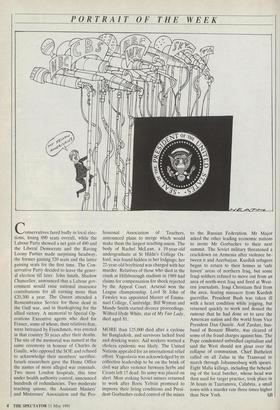PORTRAIT OF THE WEEK
Conservatives fared badly in local elec- tions, losing 890 seats overall, while the Labour Party showed a net gain of 490 and the Liberal Democrats and the Raving Loony Parties made surprising headway, the former gaining 520 seats and the latter gaining seats for the first time. The Con- servative Party decided to leave the gener- al election till later. John Smith, Shadow Chancellor, announced that a Labour gov- ernment would raise national insurance contributions for all earning more than £20,300 a year. The Queen attended a Remembrance Service for those dead in the Gulf war, and in thanksgiving for the allied victory. A memorial to Special Op- erations Executive agents who died for France, some of whom, their relatives fear, were betrayed by Frenchmen, was erected in that country 50 years after their deaths. The site of the memorial was named at the same ceremony in honour of Charles de Gaulle, who opposed the SOE and refused to acknowledge their members' sacrifice. Israeli researchers gave the Home Office the names of more alleged war criminals. Two more London hospitals, this time under health authority control, announced hundreds of redundancies. Two moderate teaching unions, the Assistant Masters' and Mistresses' Association and the Pro- fessional Association of Teachers, announced plans to merge which would make them the largest teaching union. The body of Rachel McLean, a 19-year-old undergraduate at St Hilda's College Ox- ford, was found hidden in her lodgings; her 22-year-old boyfriend was charged with her murder. Relatives of those who died in the crush at Hillsborough stadium in 1989 had claims for compensation for shock rejected by the Appeal Court. Arsenal won the League championship. Lord St John of Fawsley was appointed Master of Emma- nuel College, Cambridge. Bill Wyman and Mandy Smith started divorce proceedings. Wilfred Hyde White, star of My Fair Lady, died aged 81.
MORE than 125,000 died after a cyclone hit Bangladesh, and survivors lacked food and drinking water. Aid workers warned a cholera epidemic was likely. The United Nations appealed for an international relief effort. Yugoslavia was acknowledged by its collective leadership to be on the brink of civil war after violence between Serbs and Croats left 17 dead. Its army was placed on alert. Most striking Soviet miners returned to work after Boris Yeltsin promised to improve their living conditions and Presi- dent Gorbachev ceded control of the mines to the Russian Federation. Mr Major asked the other leading economic nations to invite Mr Gorbachev to their next summit. The Soviet military threatened a crackdown on Armenia after violence be- tween it and Azerbaijan. Kurdish refugees began to return to their homes in 'safe haven' areas of northern Iraq, but some Iraqi soldiers refused to move out from an area of north-west Iraq and fired at West- ern journalists. Iraqi Christians fled from the area, fearing massacre from Kurdish guerrillas. President Bush Was taken ill with a heart condition while jogging, but returned quickly to work and denied the rumour that he had done so to save the American nation and the world from Vice President Dan Quayle. Asif Zardari, hus- band of Benazir Bhutto, was cleared of some of the fraud charges against him. The Pope condemned unbridled capitalism and said the West should not gloat over the collapse of communism. Chief Buthelezi called on all Zulus in the Transvaal to march through Johannesburg with spears. Eight Mafia killings, including the behead- ing of the local butcher, whose head was then used for target practice, took place in 36 hours in Taurianova, Calabria, a small town with a murder rate three times higher


























































 Previous page
Previous page